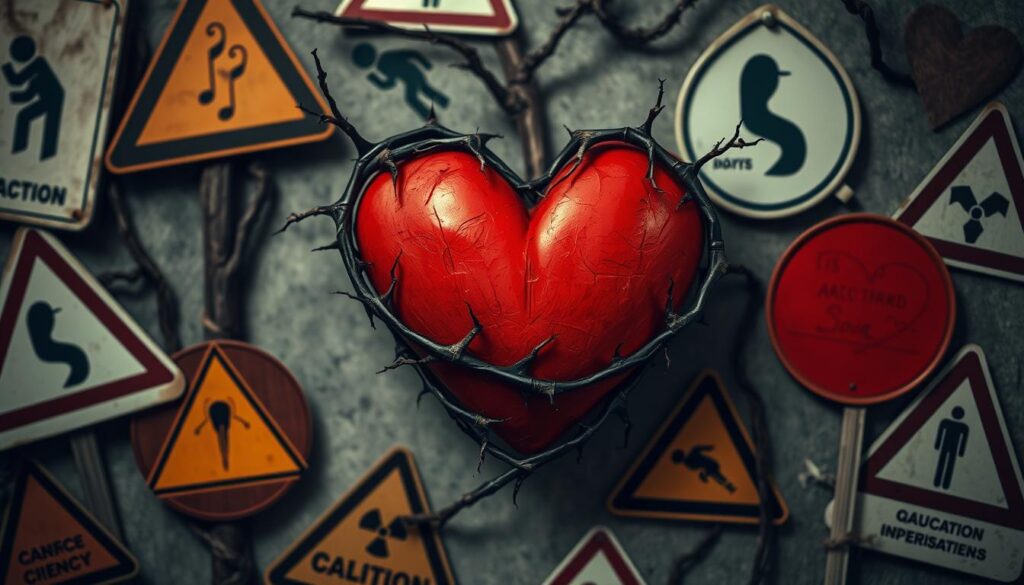Relationships have ups and downs. When anxiety comes in, it makes things harder. It’s like always worrying or feeling nervous in your relationship.
This worry can make it hard to eat, sleep, or just be in the moment. You might doubt your partner’s feelings or feel like you don’t matter. You might need constant reassurance or fear being left.
It’s important to find out why you feel this way. Maybe it’s because you worry too much or have low self-esteem. Or maybe you have a condition called relationship obsessive-compulsive disorder (ROCD).
Knowing the difference between normal worries and anxiety is key. It helps you get the right help and keep your relationship healthy.
Key Takeaways
- Relationship anxiety is characterized by persistent worry, overthinking, and nervousness in a relationship.
- Symptoms include doubting your partner’s feelings, needing constant reassurance, and people-pleasing behavior.
- Causes of relationship anxiety may include anxious attachment style, low self-esteem, general anxiety, or relationship obsessive-compulsive disorder (ROCD).
- Understanding the difference between normal relationship concerns and anxiety is crucial for seeking appropriate help.
- Open communication and professional guidance can be effective in managing relationship anxiety.
Understanding Relationship Anxiety
Relationship anxiety is common. It happens at the start of a relationship and in long-term ones. It comes from past traumas, childhood experiences, and mental health issues. Knowing why it happens is the first step to dealing with it.
What Causes Relationship Anxiety?
Many things can cause relationship anxiety. This includes attachment issues, jealousy, abandonment fears, and low self-esteem. People who have been betrayed might always wonder if their partner is loyal. Those with insecure attachment styles often can’t fully trust their partner, fearing rejection.
A study showed that those with more attachment anxiety tend to worry more about their relationships. They might seek too much reassurance or stay silent to avoid conflict.
Common Signs and Symptoms
Relationship anxiety shows up in many ways. You might worry a lot about your relationship, fear being left, or feel very jealous or possessive. You could also have physical symptoms like body aches or sleep problems.
Emotionally, it can make you feel sad, scared, and not good enough. This can really hurt your overall happiness.
Impact on Mental Health
Relationship anxiety can really hurt your mental health. It can make you question your partner’s commitment and doubt the future of your relationship. This can make your relationship less loving and intimate.
Always worrying about your relationship can also hurt your overall happiness. It can make you feel stressed, unmotivated, and even sick.
“Relationship anxiety is characterized by persistent doubt, fear, or worry in a relationship, where individuals may need constant reassurance or disregard their own needs to please their partner.”
The Psychology Behind Attachment Issues
Attachment styles start in childhood and affect how we feel in relationships. Secure attachment comes from caring parents. But anxious or avoidant attachment can make us anxious in love.
Hard break-ups and bad past relationships also add to our anxiety. If we don’t feel good about ourselves, we might worry more about love. Knowing about attachment styles helps us deal with relationship anxiety.
Studies say anxious attachment is linked to early bonds. Insecure styles, like anxious and avoidant, affect adult relationships. A 2019 study found people with anxious attachment might be less happy in love than those with secure ones.
Why do some people have anxious attachment? It’s because of their early life, trauma, and how caregivers interacted with them. This style makes it hard to be fully present in love and can hurt relationships.
Secure attachment in childhood means healthy adult relationships. People with secure attachment trust and hope more in love. But avoidant attachment makes it hard to love and connect deeply. Gender and age affect how avoidant attachment impacts our mental health.
Therapy, building secure relationships, and being open and mindful can help change attachment styles. Seeing a therapist or couples counselor who knows about attachment is a good idea for those with attachment issues.

“Attachment behaviors can influence anxiety responses to stress. People with secure attachment styles can effectively manage anxiety by connecting with attachment figures.”
Recognizing Anxiety vs. Real Relationship Problems
It’s hard to tell if you’re worried about your relationship or if there’s a real issue. Knowing the difference is key to keeping your relationship strong. It helps you deal with problems and get the right help.
Red Flags in Relationships
Some signs like not spending enough time together, always being criticized, or not respecting each other’s space are big warnings. These problems can hurt your relationship a lot. They shouldn’t be ignored.
Differentiating Between Normal Concerns and Anxiety
Normal worries in a relationship can usually be talked out. But, if anxiety is really bothering you, it’s different. It can make you feel stuck and hurt your relationship. Knowing when to worry and when to seek help is important.
When to Seek Professional Help
If your anxiety is too much to handle, it’s time to get help. Therapists can teach you how to deal with anxiety and improve your relationship. They use methods like Cognitive-Behavioral Therapy (CBT) and Dialectical Behavior Therapy (DBT) to help.
Acting on your anxiety can make your relationship better. It can lead to better communication and more trust. Don’t forget to take care of your mental health and get help when you need it.
| Relationship Red Flags | Healthy Relationship Characteristics |
|---|---|
| Lack of quality time together | Frequent, meaningful interactions |
| Constant criticism | Mutual respect and support |
| Disrespected boundaries | Clear and respected boundaries |
| Fundamental disagreements | Compromise and conflict resolution |
“Relationship anxiety can lead to significant stress in the relationship, causing avoidance, conflict, and decreased satisfaction.”
Knowing the difference between anxiety and real problems helps you fix your relationship. Remember, getting support from professionals can really help.

Breaking the Cycle of Anxious Thoughts
To beat relationship anxiety, you must stop the cycle of worried thoughts. This means looking inward, using mindfulness, and learning new ways to think. By facing and changing negative thoughts, you can control your anxiety better.
Mindfulness, like meditation and deep breathing, really helps with anxiety. It keeps you in the moment, away from worries about the future or past. Regular self-reflection helps find the reasons for your anxiety and find ways to deal with it.
Cognitive behavioral therapy (CBT) is a great way to fight anxious thoughts. With a therapist, you learn to spot and change bad thinking patterns. Journaling, relaxation, and facing fears can also help manage your anxiety and bring back emotional balance.


A Life-Changing Experience with This Weight Loss Supplement (Nagano Tonic)
I’ve always struggled with finding a weight loss solution that actually works for me. Like many, I’ve tried numerous diets, exercise routines, and supplements over the years—some worked for a short time, but nothing ever gave me long-term results. That was until I decided to try the weight loss supplement I found : Link to the Supplement.
From the moment I started using it, I noticed a difference. Not only did I feel more energized, but my cravings also became more manageable. The best part? I started seeing results much quicker than I anticipated! Over the course of just a few weeks, I noticed a significant reduction in belly fat and overall weight loss that I hadn’t been able to achieve before.
What makes this supplement stand out from all the others I’ve tried is how it supports me in my daily routine without any jitters or energy crashes. I’m able to stay focused and motivated, which has made it easier to stay on track with my diet and exercise plan.
This product truly exceeded my expectations, and I feel more confident and healthier than ever before. If you’re struggling with your weight loss journey like I was, I highly recommend giving this supplement a try. It’s been a game-changer for me, and I’m sure it can work wonders for you too!
Contant Them on email .. tonicnagano50@gmail.com
I’ve tried so many weight loss products over the years, but nothing worked like this supplement! Since I started using it, I’ve noticed a big difference in my energy levels and appetite control. In just a few weeks, I’ve lost weight and feel so much better. It’s been easy to stick with, and the results speak for themselves. Highly recommend this to anyone looking to make a real change!
I was skeptical at first, but this supplement has truly made a difference in my weight loss journey. I’ve lost weight without feeling deprived or sluggish. My cravings are under control, and I feel more confident in my body. It’s easy to incorporate into my daily routine, and the results speak for themselves. I’m so glad I gave it a try!
Thanks David, i do use the link to make my purchase. you can get too here http://surl.li/iasppy
wasn’t sure what to expect, but this weight loss supplement has really impressed me! After just a few weeks of use, I’ve already dropped a few pounds and feel more motivated to stay active. It’s helped curb my cravings and boosted my energy throughout the day. I’m excited to keep going and see even better results. Definitely worth trying!
Reach them on tonicnagano50@gmail.com
This Nagano Tonic has been amazing! In just a few weeks, I’ve lost weight, feel more energized, and my cravings are under control. Highly recommend it!
Thats the link to purchase http://surl.li/iasppy